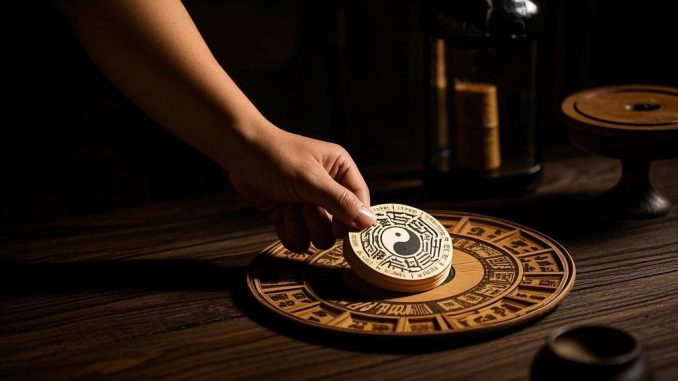
I. Introduction
The five elements of metal, wood, water, fire, and earth are fundamental concepts in Feng Shui, an ancient Chinese philosophical system that deals with the balance and harmony of energy in the environment. These elements are not just physical substances but also represent different types of energy, properties, and relationships within the cosmos and human affairs. Understanding their meanings and interactions in English can help spread knowledge about Feng Shui and its associated cultural concepts.

II. Metal
1.Metal in Feng Shui

- In Feng Shui, metal represents clarity, precision, and decisiveness. It is associated with the autumn elements and harvest, it is also associated with the West, the White Tiger, A position that plays an important role in feng shui layout. The autumn elements and harvest, it also relates to the west, as in the Bagua (an important concept in Feng Shui), it represents one of the directions with significant influence. Metal energy can be thought of as. A material resembling gold, such as metal, jewelry, And sharp objects like knives or swords. In terms of health, it has to do with the respiratory system and the skin. The energy of metal can be associated with materials like metals and precious jewels, as well as sharp – edged objects like knives or swords. In terms of health, it is related to the respiratory system and skin.
2.Representation in the Environment
- In a physical space, metal – like elements can be introduced through the use of metal – colored decor, such as silver or gold wallpapers, or the placement of metal objects like wind chimes. A well – designed metal – themed area in a home can promote a sense of order and focus. For example, a silver – colored bookshelf in a study can enhance the concentration needed for reading and studying.
3.Symbolism and Cultural Significance
- Culturally, metal has always been associated with power and strength. In ancient China, metal was used for weapons and armor, symbolizing protection and domination. In Feng Shui, the positive aspect of metal energy is harnessed to bring about clarity in decision – making and a strong sense of self – discipline. However, an excess of metal energy can lead to coldness, rigidity, and lack of flexibility.
III. Wood
- Wood’s Role in Feng Shui

- Wood represents growth, expansion, and new beginnings. It is associated with the east in the Bagua, symbolizing the rise of the sun and the start of a new day. Wood energy is like the energy of a living tree, full of vitality and the potential for growth.
- Environmental Manifestation
- In interior design, wood can be incorporated through the use of wooden furniture, wooden flooring, or even wooden walls in some cases. Live plants are also a great way to bring wood energy into a space, as they are the physical manifestations of wood in nature. For instance, placing aloe vera plants in a bedroom can not only bring the fresh and lively feeling of wood but also have some health – related benefits.
- Symbolic Meaning
- Wood symbolizes life and vitality. It is associated with creativity, innovation, and the development of new ideas. In traditional Chinese culture, bamboo is a classic symbol of wood energy, representing resilience, perseverance, and the ability to bend without breaking. A lack of wood energy in a Feng Shui context may lead to a sense of stagnation and lack of motivation.
IV. Water

- Water in Feng Shui Principles
- Water is the element of flow, adaptability, and wisdom. It is associated with the north in the Bagua. Water energy is not just about actual water bodies but also about the concept of liquidity and change.
- Appearance in the Living Space
- In a home or outdoor space, water can be introduced in various forms. Indoor fountains are a popular choice in Feng Shui – friendly designs. The sound and movement of the water can promote a sense of calm and relaxation. Even a small aquarium with fish can bring some water energy into the room. In outdoor landscapes, ponds or small streams can enhance the overall Feng Shui of the property.
- Cultural and Symbolic Significance
- Water is seen as a source of life in Chinese culture. It symbolizes depth, intuition, and the ability to go with the flow. However, if not managed properly, too much water energy can lead to problems like emotional instability, especially in a residential setting.
V. Fire

- The Significance of Fire in Feng Shui
- Fire represents passion, energy, and transformation. It is associated with the south in the Bagua. Fire energy is like the heat and light emitted by a fire, full of vitality and the power to change things.
- Representation in the Surroundings
- In a building, warm – toned lighting can be used to bring fire energy into a space. Red is a color often associated with fire in Feng Shui, so red decor elements like cushions or paintings can be added. But care must be taken as an excess of fire energy can lead to anger, impatience, and a feeling of being overheated.
- SymbolicImplications
- Fire symbolizes drive and the spark of creativity. It is also associated with transformation and purification. In traditional Chinese festivals, fire – making activities like lighting lanterns are important, reflecting the cultural significance of fire.
VI. Earth
- Earth Element in Feng Shui
- Earth is the element of stability, nourishment, and grounding. It is associated with the center in the Bagua, representing the foundation of all things. Earth energy is like that of a fertile land, capable of supporting and nurturing all forms of life.
- Existence in the field of environment
- In interior design, earth – toned colors like beige and brown can be used extensively. Terra – cotta pots or stone elements can also bring earth energy into a space. In landscaping, well – maintained lawns and flower beds can represent the earth element.
- Symbolic meaning
- Earth symbolizes harmony, balance, and security. It provides a sense of foundation and support. A lack of earth energy may lead to feelings of instability and a lack of direction.
VII. Interactions Between the Five Elements
- Mutual Generation
- Wood generates fire, as wood can be used as fuel for fire. Fire generates earth, as when wood burns, it turns into ash which is a form of earth. Earth generates metal, for example, metal ores are found in the earth. Metal generates water, like when a metal container is placed in the sun, it may sweat water droplets, symbolizing metal’s ability to generate water. Water generates wood, as water is essential for the growth of plants.
- Mutual Restraint
- Wood restrains earth, as trees and plants take root in the earth and draw nutrients from it. Earth restrains water, as the land can hold and direct the flow of water. Water restrains fire, as water can extinguish fire. Fire restrains metal, as fire can melt metal. Metal restrains wood, as metal tools like axes can cut down trees.
VIII. Conclusion
The five elements of metal, wood, water, fire, and earth in Feng Shui are rich in meaning and meaning. They influence the aura in the living space through interaction, environmental expression and symbolic meaning. Understanding the English expressions of these elements helps to spread Feng shui knowledge globally and promote cultural exchange. They relate to each other and have an impact on the aura of the living space through their performance and symbolic meaning in the environment.Understanding these elements in English is not only helpful for spreading knowledge of Feng Shui but also promotes cross – cultural communication and understanding.

Leave a Reply